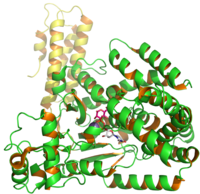
Receptors and Binding Structures for Clostridium difficile Toxins A and B.
Sign Up to like & getrecommendations! Published in 2017 at "Current topics in microbiology and immunology"
DOI: 10.1007/82_2016_17
Abstract: Two characteristics of toxins A and B from C. difficile (TcdA, TcdB) are important for the understanding of the pathogenic effect of these homologous toxins. First, these toxins are huge single-chain but multidomain proteins that… read more here.
Keywords: clostridium difficile; structures clostridium; receptors binding; binding structures ... See more keywords

Efficient production of recombinant Secretory IgA against Clostridium difficile toxins in CHO-K1 cells.
Sign Up to like & getrecommendations! Published in 2021 at "Journal of biotechnology"
DOI: 10.1016/j.jbiotec.2021.02.013
Abstract: Despite the essential role secretory IgAs play in the defense against pathogenic invasion and the proposed value of recombinant secretory IgAs as novel therapeutics, currently there are no IgA-based therapies in clinics. Secretory IgAs are… read more here.
Keywords: clostridium difficile; secretory; recombinant secretory; difficile toxins ... See more keywords

Effect of natural products on the production and activity of Clostridium difficile toxins in vitro
Sign Up to like & getrecommendations! Published in 2018 at "Scientific Reports"
DOI: 10.1038/s41598-018-33954-2
Abstract: Clostridium difficile infection is a toxin-mediated disease of the colon. C. difficile virulence is primarily attributed to the production of toxin A and toxin B; thus this study was aimed to investigate the effect of… read more here.
Keywords: production; difficile; natural products; difficile toxins ... See more keywords

Retrospective analysis of Clostridioides difficile and other intestinal infections in patients with Crohn’s disease and ulcerative colitis in the tertiary hospital in Poland. POLIBD survey results
Sign Up to like & getrecommendations! Published in 2021 at "Gut Pathogens"
DOI: 10.1186/s13099-021-00471-z
Abstract: Background There are several studies which evaluated the number of infections caused by enteric pathogens, including Clostridioides difficile in patients with inflammatory bowel disease (IBD). Our aim was to assess the prevalence of intestinal infections… read more here.
Keywords: clostridioides difficile; difficile toxins; intestinal infections; retrospective analysis ... See more keywords

Binding and neutralization of C. difficile toxins A and B by purified clinoptilolite-tuff
Sign Up to like & getrecommendations! Published in 2021 at "PLoS ONE"
DOI: 10.1371/journal.pone.0252211
Abstract: Clostridioides difficile (C. difficile) infection is a major public health problem worldwide. The current treatment of C. difficile-associated diarrhea relies on the use of antibacterial agents. However, recurrences are frequent. The main virulence factors of… read more here.
Keywords: purified clinoptilolite; clinoptilolite tuff; binding neutralization; difficile toxins ... See more keywords

Glucosyltransferase-dependent and independent effects of Clostridioides difficile toxins during infection
Sign Up to like & getrecommendations! Published in 2022 at "PLoS Pathogens"
DOI: 10.1371/journal.ppat.1010323
Abstract: Clostridioides difficile infection (CDI) is the leading cause of nosocomial diarrhea and pseudomembranous colitis in the USA. In addition to these symptoms, patients with CDI can develop severe inflammation and tissue damage, resulting in life-threatening… read more here.
Keywords: clostridioides difficile; difficile toxins; cdi; epithelial damage ... See more keywords

Rapid visualization of Clostridioides difficile toxins A and B by multiplex RPA combined with CRISPR-Cas12a
Sign Up to like & getrecommendations! Published in 2023 at "Frontiers in Microbiology"
DOI: 10.3389/fmicb.2023.1119395
Abstract: Purpose Clostridioides difficile (C. difficile) infection is the most common cause of nosocomial infection, which is a severe challenge in modern medical care. Currently, many laboratory diagnostic methods for C. difficile are available, such as… read more here.
Keywords: difficile toxins; clostridioides difficile; rpa; detection ... See more keywords

Inhibition of Clostridioides difficile Toxins TcdA and TcdB by Ambroxol
Sign Up to like & getrecommendations! Published in 2022 at "Frontiers in Pharmacology"
DOI: 10.3389/fphar.2021.809595
Abstract: Clostridioides (C.) difficile produces the exotoxins TcdA and TcdB, which are the predominant virulence factors causing C. difficile associated disease (CDAD). TcdA and TcdB bind to target cells and are internalized via receptor-mediated endocytosis. Translocation… read more here.
Keywords: difficile toxins; clostridioides difficile; toxins tcda; tcda tcdb ... See more keywords